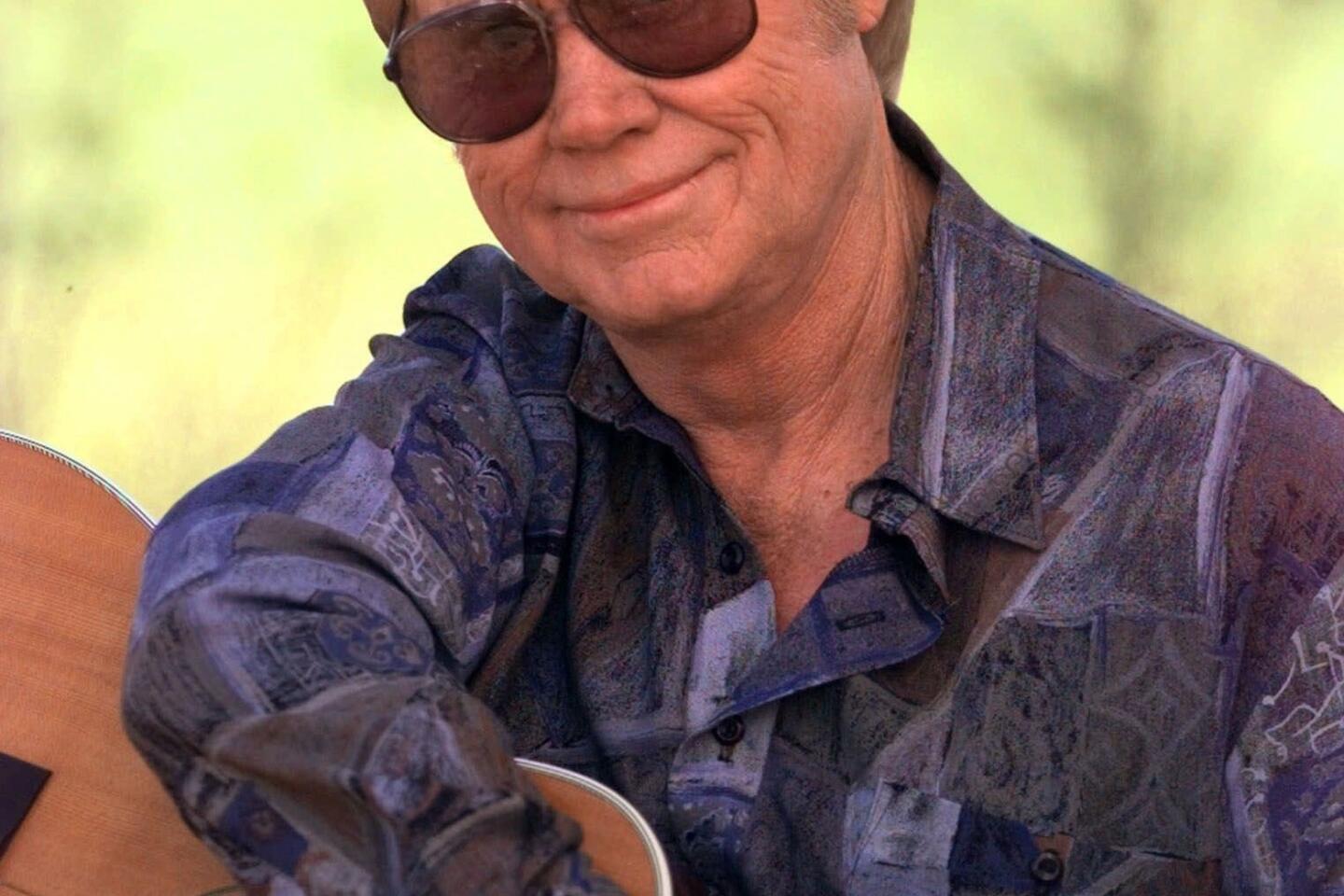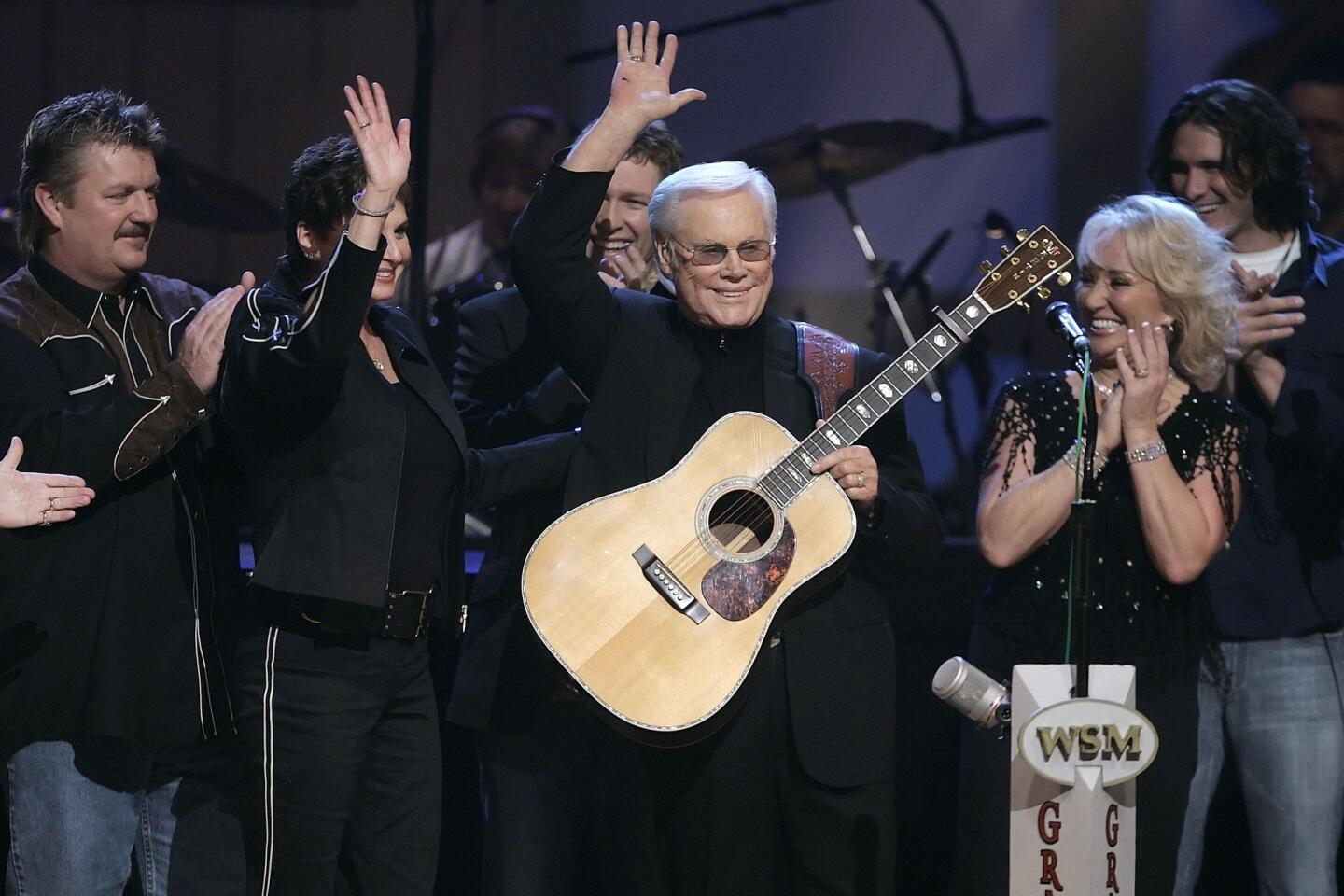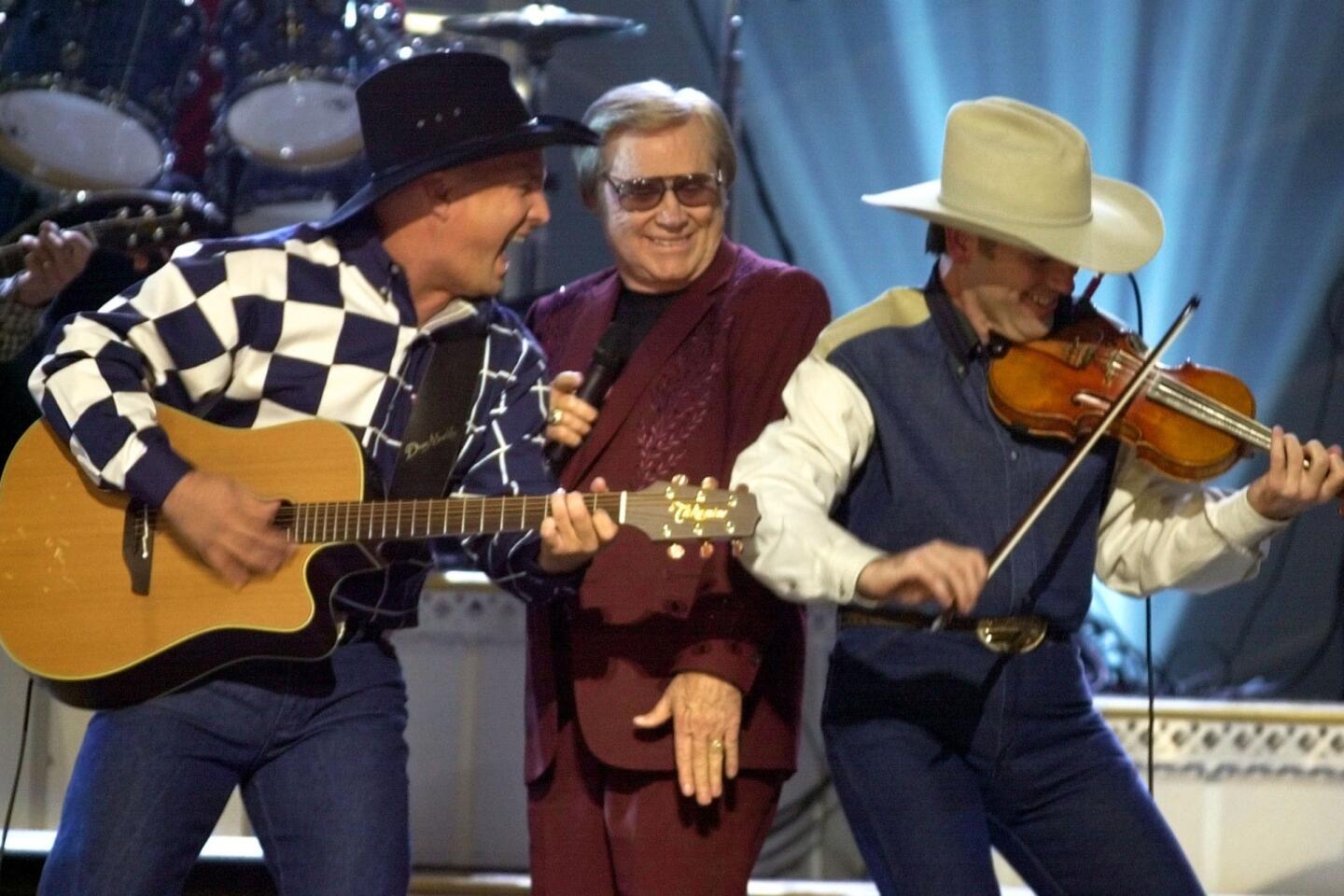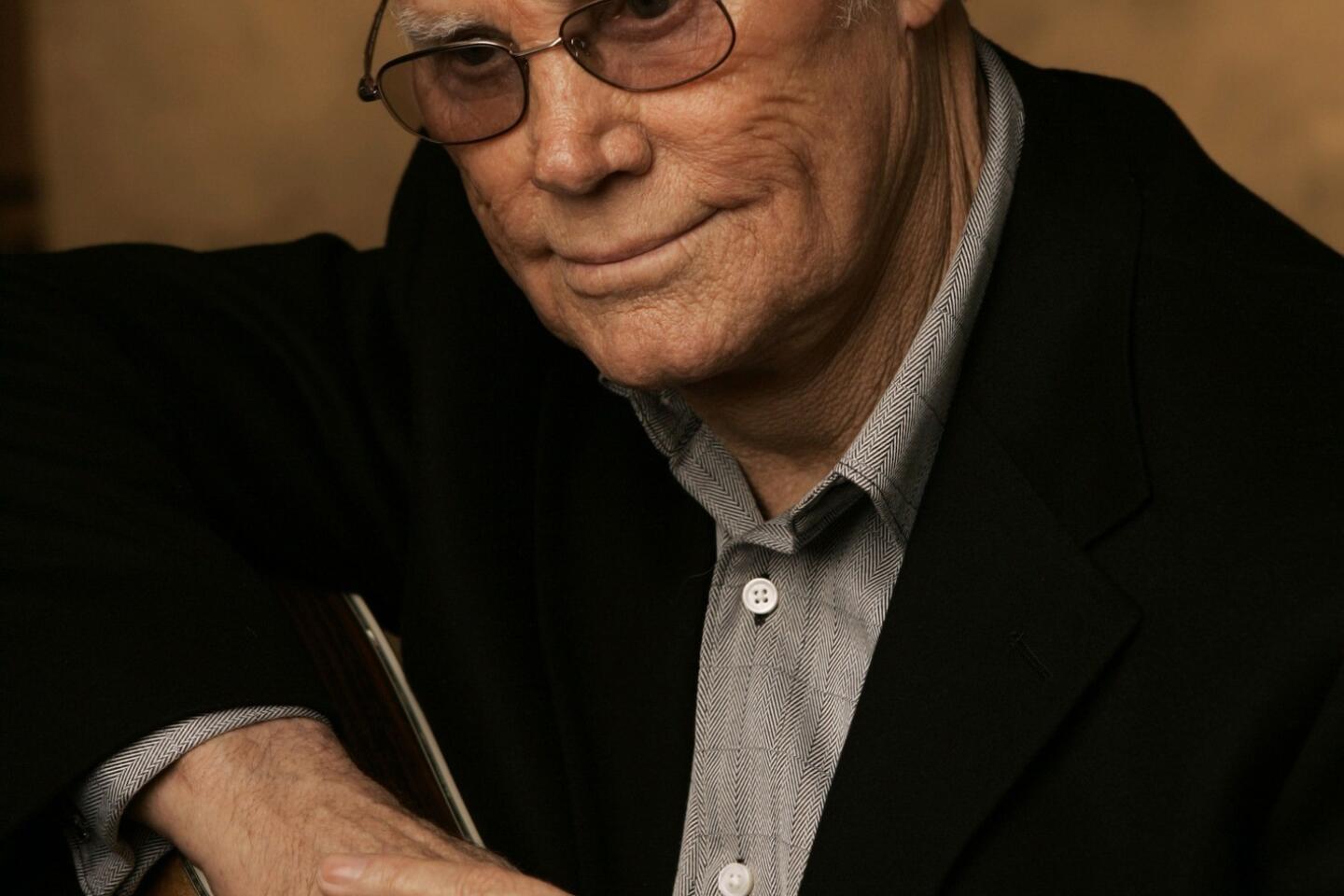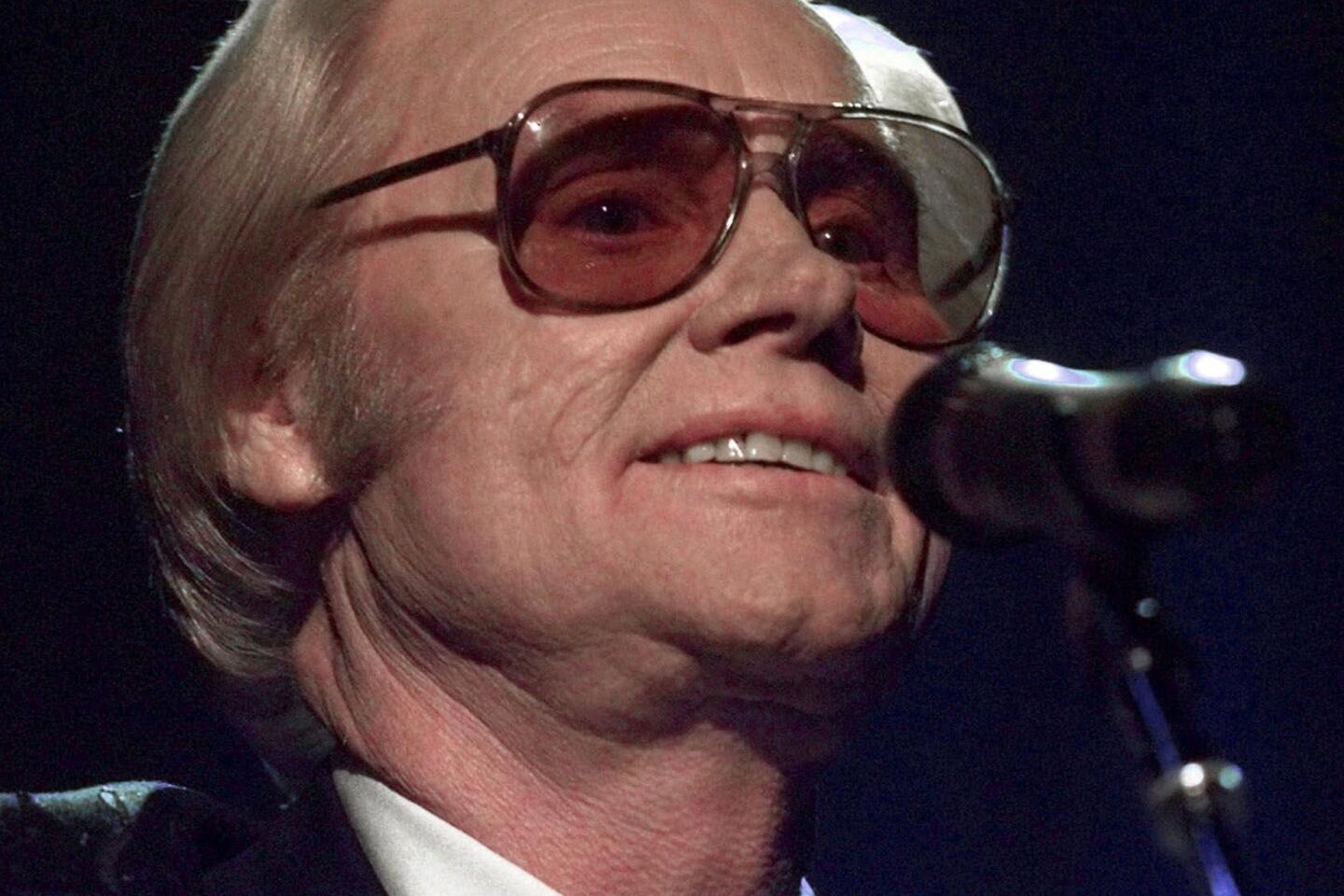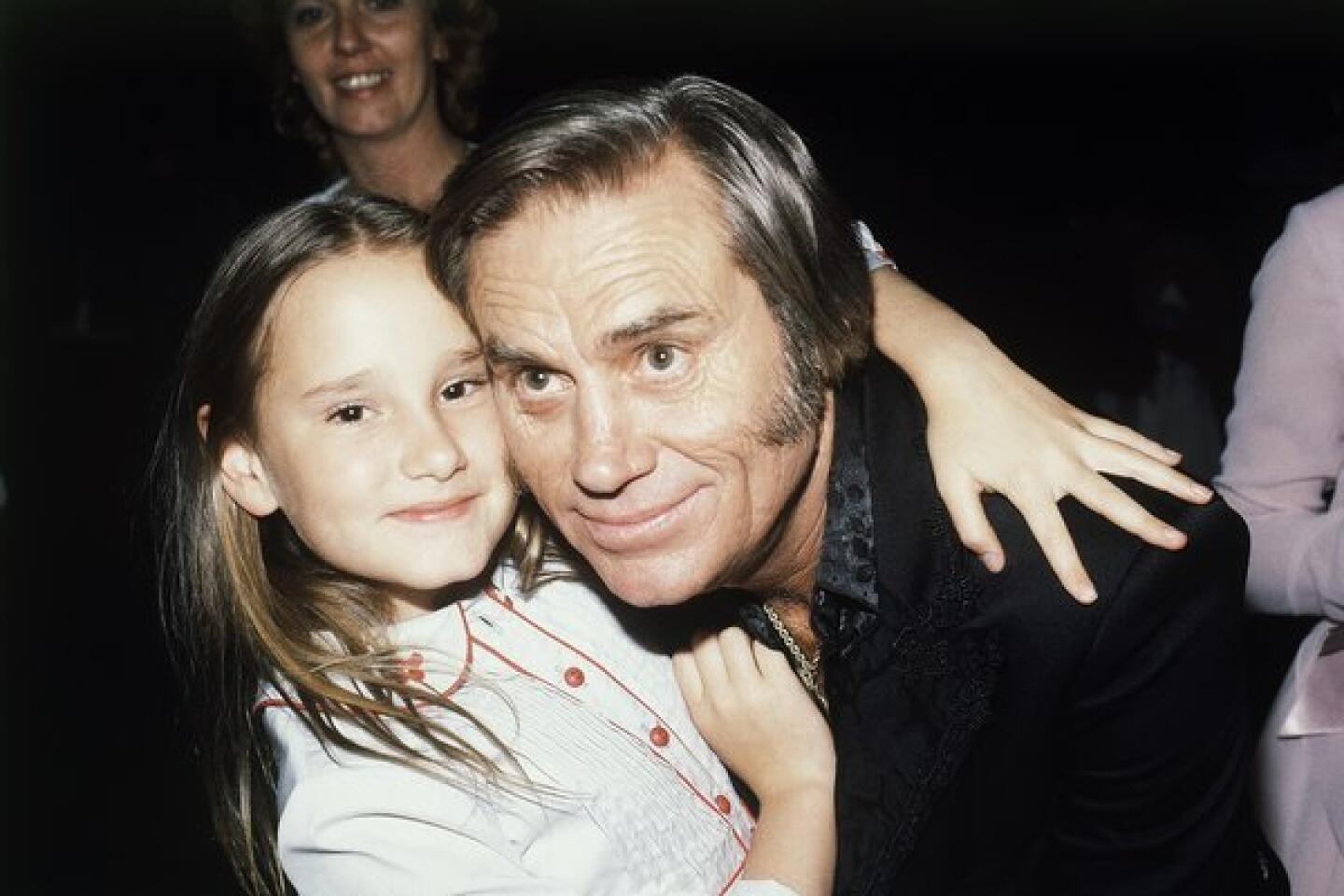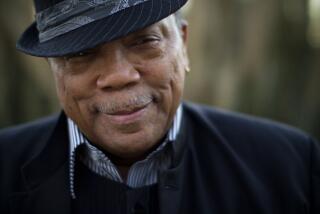George Jones dies at 81; country music icon
Three decades ago, an east Texas singer named George Jones took on an impossibly melodramatic, shamelessly sentimental song about a man who desperately clutched at lost love until his dying breath.
His 1980 recording of “He Stopped Loving Her Today” became one of the most revered songs in country music history.
Singers Hank Williams, Johnny Cash and Merle Haggard were known for the poetically crafted lyrics of their country standards. But Jones’ anguish-drenched vocals elevated “He Stopped Loving Her Today” above its soap-opera lyrics in polls of the greatest country music songs.
George Jones: Career in Photos
From 1955 to 2005, Jones put 167 records on the Billboard Hot Country Songs chart — a history-making 143 of them in the top 40 — and won two Grammy Awards. Along the way, he won admirers as diverse as Frank Sinatra, James Taylor and the Who’s Pete Townshend.
Jones, 81, died Friday in Nashville, a little more than a week after being hospitalized for a fever and irregular blood pressure, ending a long, tumultuous life that frequently outstripped the songs he sang in terms of sheer drama.
“The world has lost the greatest country singer of all time. Amen,” Merle Haggard said Friday in a statement.
Vince Gill, whose 20 Grammy Awards make him the most lauded male country singer ever, said, “There aren’t words in our language to describe the depth of his greatness. I’ll miss my kind and generous friend.”
In George Jones, glorious musical achievement lived side by side with personal heartbreak. Frustration, failure, disappointment and loss gave way later in life to personal and artistic redemption in recent decades.
That Jones continued touring and recording until this month astonished and delighted fans who had seen him struggle with alcohol and drug abuse, multiple marriages and divorces, lawsuits over his erratic behavior, and brushes with death in motor vehicle accidents. His life became the stuff of country legend: Following a drinking binge during which his wife took his car keys so he couldn’t drive, Jones famously commandeered a motorized lawn mower and drove himself to the nearest liquor store.
“Hopefully [people] will remember me for my music and forgive me of the things I did that let ‘em down,” Jones said in 2006. He also understood he wouldn’t be absolved of everything: “There are some things you just can’t make up to people,” he said of the many performances he missed over the years because of his struggles with alcohol and drugs, which led to the nickname “No Show Jones” that followed him for many years in the 1970s and ‘80s.
Yet, along the way, he continued to deliver hit after hit from 1955, when he first scored with “Why Baby Why,” through his final appearance on the pop chart 50 years later as a guest of Waylon Jennings’ son Shooter Jennings on “4th of July.”
PHOTOS: Celebrities react to the death of George Jones
“In country music, George Jones set the standard long ago,” the late Johnny Cash once said. “No one has compared to him yet.”
Or, as the now-departed Waylon Jennings famously remarked, “If we could all sound like we wanted to, we would all sound like George Jones.”
“George Jones was the ultimate voice of country music,” said Robert Hilburn, The Times’ former pop music critic. “He was someone whose pure and traditional tone represented to country music singing what Hank Williams represented to country songwriting. When people talk about country music being the white man’s blues, they can explain their point by simply playing a George Jones song.”
George Glenn Jones was born Sept. 12, 1931, and grew up in Saratoga, a small, dusty town northeast of Houston in the Big Thicket region of Texas. He was the eighth child of George Washington Jones, a pipe fitter and shipyard worker who played guitar, and, Clara Jones, a church pianist.
The modest household was dominated by the sounds of gospel and country music — and the abusive rages of the young singer’s father, who turned to alcohol to drown his pain when Jones’ sister died from a fever.
“We were our Daddy’s loved ones when he was sober, his prisoners when he was drunk,” the singer wrote in his 1996 autobiography, “I Lived to Tell the Tale.”
As an 11-year-old, Jones made his first money as a singer when he played guitar and warbled Eddy Arnold songs for coins in front of a local church.
The influence of Hank Williams’ songs, capturing nearly existential heartache as well as unbridled joy, became a major source of inspiration, along with the honky-tonk songs of Ernest Tubb and, especially, Lefty Frizzell, whose signature was his extraordinary twisting and turning of syllables, words and phrases, a model that Jones quickly adopted.
In his early 20s, after dropping out of school, serving a stint in the Army and working briefly as a house painter, Jones signed his first recording deal. The success of “Why Baby Why” in 1955 paved the way for his joining the Grand Ole Opry the next year. He had a number of hits in the next decade, including “White Lightning,” “She Thinks I Still Care” and “The Race Is On.”
His earliest successes came with upbeat numbers that showcased the upper part of his vocal range, but soon he would exploit the rich, deep notes at the other end of his range. A 1957 duet with Jeanette Hicks, “Yearning,” also brought to bear his adroitness with ballads of deep heartache, and by the time he recorded “Tender Years” in 1961, Jones was becoming the master of romantic disillusionment that would become his artistic signature.
RELATED: George Jones and Johnny Cash sing
He’d already had firsthand experience in that realm. In 1950 he married Dorothy Bonvillion, with whom he had a daughter, Susan, but the couple divorced within about a year, and Jones was periodically in legal difficulty for not paying child support. He got married a second time in 1954, to Shirley Corley. They had two sons, Jeffrey and Bryan, before divorcing in 1968.
It was while he was married to Corley that the lawn mower ride to the liquor store took place, one that Jones revisited in a 1996 music video for “Honky Tonk Song.” Other artists including Hank Williams Jr., Vince Gill and John Rich also referenced the incident in various songs and videos.
Country queen Tammy Wynette, Jones’ most celebrated duet partner and his wife from 1968 to 1975, recounted a similar incident in her 1979 autobiography, saying she once went looking for her husband at 1 a.m. and found him and their lawn mower at a nearby liquor store.
The real-life combination of two of country music’s greatest voices was the stuff of fairy tales, but the bitterness of their split often spilled into the public spotlight for years after. They reconciled well before her death in 1998 from a blood clot; Jones recorded a duet in 2007 with their only child, Georgette, much to the delight of longtime fans.
That his self-destructive streak eventually became comic fodder was little short of miraculous to those who were around him in his darkest days. Waylon Jennings and Johnny Cash said they periodically had to help Jones financially because he had become penniless between fending off lawsuits for missed performances and arrests for drug and alcohol charges. He filed for bankruptcy in 1979, and despite a stint in rehab in 1982, he was arrested the following year in Mississippi for public intoxication and cocaine possession.
The following day he crashed his car and nearly died. Once when he was arrested for drunken driving, the incident was videotaped and the public got a glimpse of Jones seething and lashing out at the camera. His weight dropped from around 160 pounds to barely 100 pounds.
Multiple arrests, divorces, lawsuits and bankruptcies severely undercut his commercial successes, but they also lent an air of authenticity — even autobiography — to songs such as “These Days (I Barely Get By),” and “If Drinkin’ Don’t Kill Me (Her Memory Will).”
A creative downslide in the 1970s started to turn around in 1980 when he recorded Bobby Braddock and Curly Putman’s “He Stopped Loving Her Today,” which earned him the Grammy Award for male country vocal performance, a trophy he would collect again nearly two decades later for the song “Choices” from his 1999 album “Cold Hard Truth.”
But it wasn’t until he met his fourth wife, Nancy Sepulvado, whom he married in 1983, that he slowly but surely left the vices behind and began his transformation from near pariah to country music patriarch, a status he enjoyed for the last three decades. Within a year of their marriage, he was clean and sober, Jones wrote in his autobiography.
She survives him, along with several children, grandchildren and his sister, Helen Scroggins.
In 1983 he opened the 65-acre Jones Country Music Park near Beaumont, Texas, a move he said saved “my life and everything else.” It occupied much of his time and attention until he sold it in 1988 and moved back to Nashville to reenergize his music career.
Jones was inducted into the Country Music Hall of Fame in 1992, and two years later rebounded from coronary bypass surgery to continue his comeback. By 1996, he was playing 120 shows a year. He proudly told reporters that his car’s personalized license plate was “IDOSHOW,’’ a winking dismissal of his old nickname.
Even as he was being lionized in songs by succeeding generations of fans and singers — among them Alan Jackson, whose 1991 hit “Don’t Rock the Jukebox” asked patrons of a honky tonk to skip the rock numbers because “I want to hear some Jones” — Jones himself was grappling with a dearth of new material to work with and dwindling commercial prospects.
“If you ain’t a cute little fellow or a girl with a cute butt, they’re not interested,” Jones told The Times in a 2006 interview. Consequently, songwriters would offer their best material to those currently at the top of the charts, rather than veterans like Jones who were kept off the radio airwaves.
He finally broke through with “Cold Hard Truth,” widely acclaimed as his best album in nearly 20 years.
Besides winning Grammys, Jones was a five-time Academy of Country Music Awards winner and seven-time honoree of the Country Music Assn. In 2008, he was given a lifetime achievement award as part of the annual Kennedy Center Honors in Washington, D.C.
Jones couldn’t escape misfortune even at a peak of his career renaissance. While driving near his home in 1999, he lost control of his car and drove it into a bridge, causing multiple internal injuries from which he nearly died. He’d gone off the wagon and said he had taken his first drink in more than a decade, although he said the accident was caused because he was changing a cassette in his car’s stereo and took his eyes off the road. He was fined $500 and required to return to rehab, after which he said the scare cleared him of his interest in alcohol for good.
“Unlike most country singers,” biographer and journalist Nick Tosches once wrote of Jones, “there is no cheap melodrama in his singing. He works his rough Texas voice with a noble gravity, wringing from every word its full color and power. He has a poet’s sense of rhythm: the most pedestrian lyrics emerge from his mouth with Teutonic dignity.”
Former Times staff writer Geoff Boucher contributed to this report.
More to Read
Start your day right
Sign up for Essential California for the L.A. Times biggest news, features and recommendations in your inbox six days a week.
You may occasionally receive promotional content from the Los Angeles Times.
